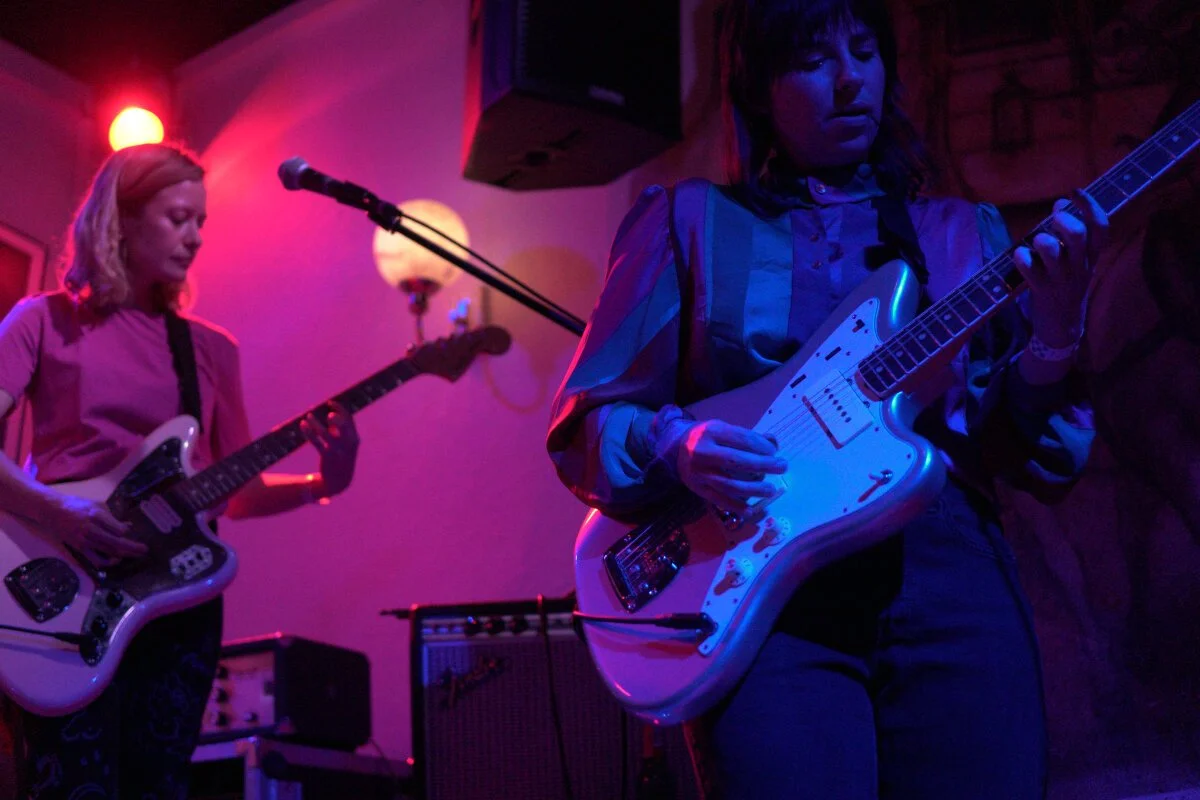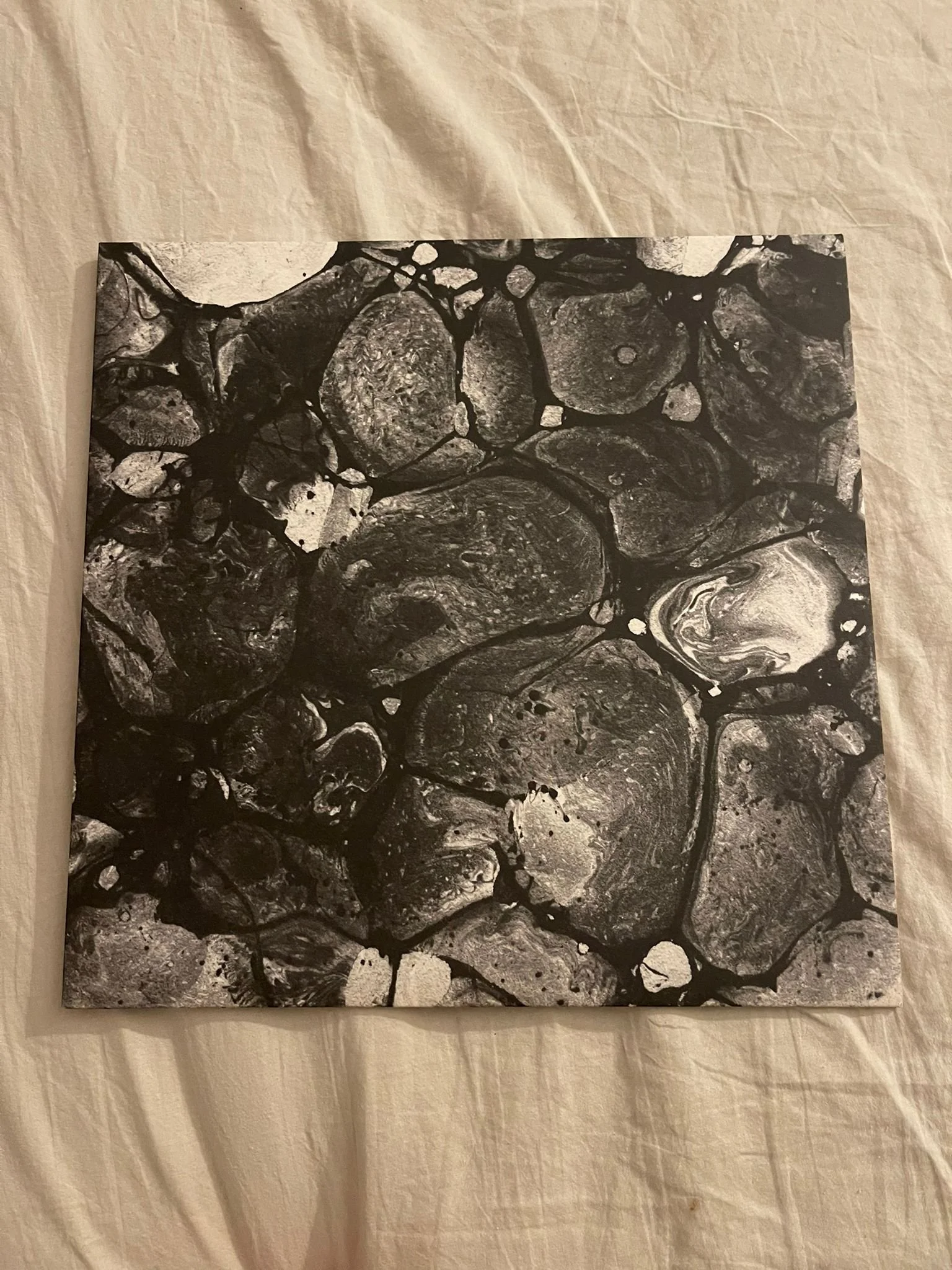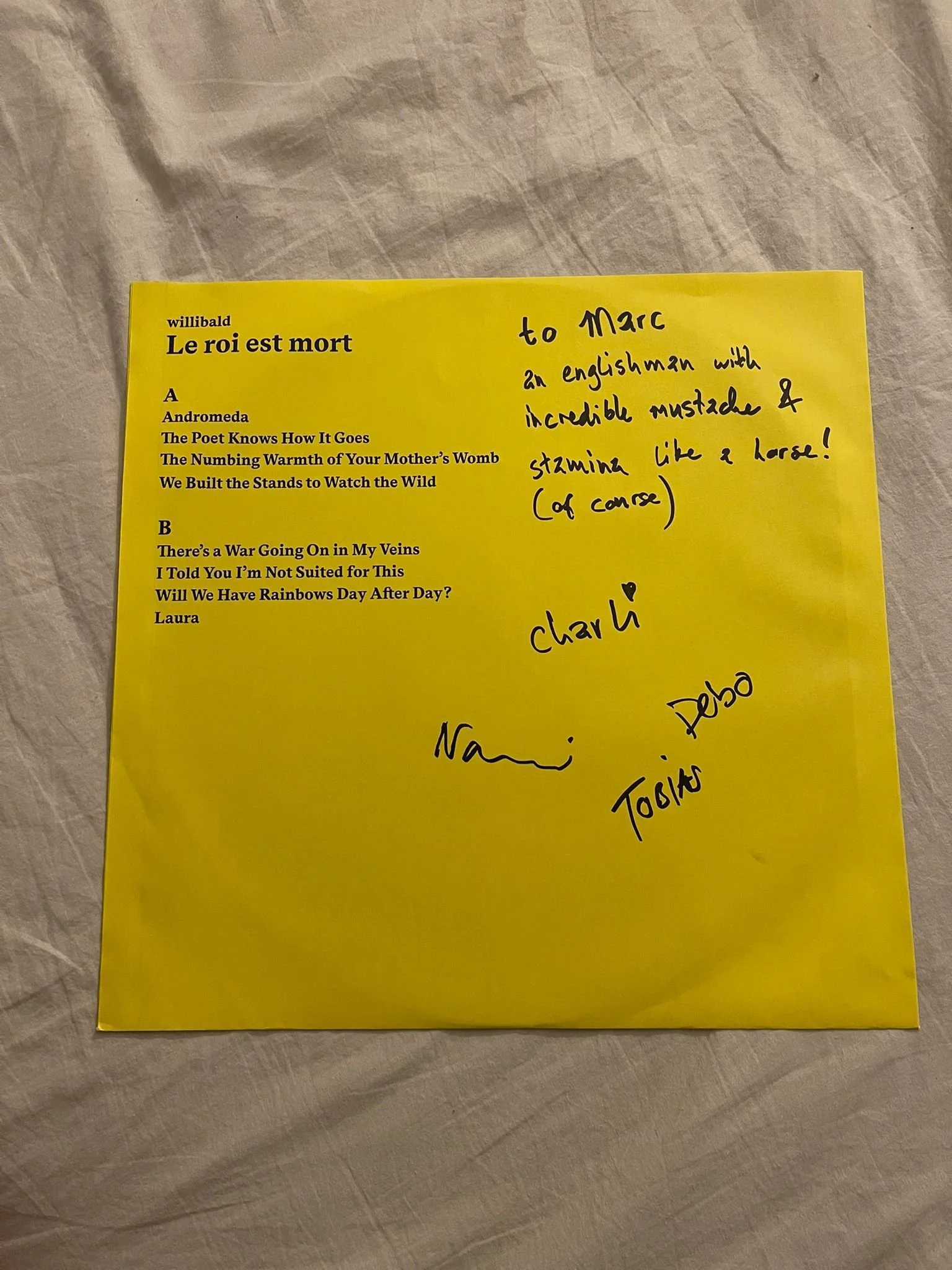Interview with willibald
(willibald live at Kombinat 2022, photo copyright: Mar Vilà Solé)
In February this year, I talked with bassist, Charli Grögli, and guitarist/bowed guitarist, Naemi Zurbrügg of the band, willibald, to discuss their latest singles, Crumbs and Y, and to know more about the band’s history and their debut album, le roi est mort. The first part of the interview was released shortly afterwards and after much delay, the second part of the interview is finally ready to be published.
It was great to revisit the conversation months later, transporting me back to the video interview and remembering how their friendships were more important than the music itself. As mentioned in the first interview, I came across the band at the first Kombinat Festival in 2022, a time where I chose which band to see live at the festival based on a written description and I thoroughly enjoyed seeing willibald playing in a packed Gotthard Bar. The performance would also motivate me to go see them a second time a few weeks later at Gaswerk in Winterthur, where I would also pick up a copy of le roi est mort. The album is a really great listen - the imagery through the lyrics, the simmering tension through the music before it explodes, the raw emotion in the songs. It would eventually go onto win the 2020 album of the year from Musikförderung Bern, the band’s hometown.
Tell us a bit about the history of willibald
Charli: Well, it started with Deborah, the singer and guitarist. She was playing at a party in a flat share about ten years ago and I was in attendance. I asked her if we could make music together, and she told me that she had another gig a month later. She added that she didn’t really need a guitarist but asked if I could play bass as well. I replied that as long as I could make music with her, that would be alright with me. And that was the beginning.
What style of music did she play back then?
Charli: She had an electric guitar with an amp, but the style was more, I don't want to say laid back, but more intimate. I think she played the song, There's a War Going on in My Veins, there. For the upcoming gig we wanted to have a drummer as well. So we started searching for drummers, and that was quite the journey. But we're known for...
Naemi: You were picky.
Charli: So then there were three of us, including a drummer back then. And we did an EP (While We Feel Romantic on Rooftops) and somewhere around then you got involved, Naemi, right?
Naemi: After the EP, actually. I don't even know where I met you, Charli, exactly. At some party as well, maybe? You just wanted to make music with me.
Charli: Yeah, that's true. I wanted to make music with Deborah, I wanted to make music with you.
Naemi: Yeah, without knowing what I actually do.
It sounds like Charli asks everyone in Bern to make music with him.
Naemi: I wanted to do something together with them, no matter what, and I asked what I could do. They really wanted me to play the synth but I actually hate playing the keys. As I wanted to be part of the band so badly, I took home the synthesiser and I tried to play it. It was a bit hard and I suggested that maybe I could do something else other than playing the synth.
I understand you have a background in classical music
Naemi: I played cello for about ten years but that’s a long time ago now. If I were to pick up the cello these days, I wouldn’t be any good but I kept the bow.
How did you decide to combine the bow with the guitar?
Naemi: I wanted to play guitar but as they wanted to have some kind of soundscapes with a synthesiser, I thought I could combine the guitar with the bow. It came quite naturally to me.
Do you play certain notes or barre chords on the guitar? Do you have the guitar tuned differently?
Naemi: No, I can only play the lowest string, the highest string or all the strings together because the guitar isn’t curved. I'm a bit limited to what I can do. I don't use different tunings, I just work with effects and apply pressure on the strings. It's quite simple.
There are more and more bands that use this way of playing but more for an intro. The difference is that I really have the bow for every other song. This is why I am credited as playing guitar and bow.
And Charli, you are more of a guitarist?
Charli: Yeah, I was, or I am. I had to learn how to, not exactly how to play the bass, but how to use the strings or the bass, because as you know, it's a different mindset. I had quite a learning curve to get there.
Naemi: I think this is actually funny, because you play the bass more as a guitarist.
Charli: And you play the guitar more like a bass.
Naemi: Exactly. Yeah, exactly, because the cello has more of this role of a bass guitar with its bass lines. Sometimes you copy my bass lines, or the other way around. I think it’s funny because we switch roles sometimes.
Somewhere along the lines, it seems that Deborah's laid back guitar and playing and lyrics became a lot more aggressive. How did that happen?
Charli: That's due to the shitty sound system. We have a very small room where we practise, and the drums are quite hard to play softly. Our sound system is so bad that we had to get louder with everything and it just naturally evolved into noise.
Where did you record the album?
Naemi: At oh, homesick studios. in Nidau in Biel.
And you went in there with eight or nine songs already prepared?
Naemi: We practised with a metronome for half a year, I think. Actually, we always played with a metronome.
Charli: And the sound guy, Stef Allemann, he was there with us with the process, he gave us feedback, and how, in his mind, we had to change things. I think we streamlined a bit.
Naemi: He wanted to make them shorter and faster.
How did you compose the songs? Does each person bring an idea? Do you jam them out?
Charli: Some songs were really more or less Deborah's from start to finish. Others were just ideas. We had to just rework them until we all liked them. I think that's something that really changed with how we're working now. I mean, not the way we're working, but the way the songs turn out because I think we're less interested in these different components such as verse, chorus, bridge. Nowadays, the songs we're writing are more homogenous.
Naemi: What we almost never do is to just jam together and just start from zero. Normally, the idea normally comes from one person, mainly Deborah or Charli. Sometimes but quite rarely, I would have an idea. We would show it to the others and see how it could be developed into a song. I think we don't have one song that started from zero.
Charli: I think there's one. Sacrifice (editor’s note: an unreleased song) started as a jam but from six years ago.
Naemi: I think one main difference with other bands is that we are not really a jam band. It's quite rare for me to already have an idea about what should be played on the other instruments. I think there we have a lot of freedom to just play what we want to play. We give each other suggestions about the directions of the parts but we never tell each other what to play.
Charli: Sometimes we work with moods. I think we talk quite a lot. Not exactly about what the meaning of the song is, but maybe about the theme or we are thinking about. Sometimes it's atmospheres from movies that we try to replicate or at least that we have like the same kind of mood in our heads. At least three of us, Naemi, Deborah and myself, really enjoy the movie Under the Skin by Jonathan Glazer. It has such a great vibe and we use this type of setting to get somewhere.
Naemi: It helps us more than with other music references. I think it's more with pictures or moods and we used to work a lot with colours. For the first album, every song had a colour and a picture that we tried to remember while playing. We don't do this anymore, but at the time we did it a lot.
Naemi: I try to work with sounds because I’m not a technical guitarist and I don’t use any crazy picking techniques.
Charli: But within the band she's called Santana.
Naemi: Yeah, that's true but in an ironic way.
We really like each other, we are really good friends, making music and hanging out together is fun. As Charli said, we talk a lot. We always talk about how life is and what is going on. We don’t just meet up to make music and drink. Life is really important. What is happening in our lives besides music. Maybe this is also what we put in the music after.
Charli: Since our drummer, Danilo, joined about two years ago, it really feels that everything has fallen into place. We had two drummers before him and it feels like we're set. That's a really, really nice feeling too.
Do you also meet up outside of band practice?
Naemi: We do but we’re quite busy with life. It's an important exchange. We all really like to dance. If there's good music after a concert and we get the chance, you will find all four of us on the dancefloor.
Charli: They have to chase us out with the broom!
Naemi: Sometimes we start playing together and then we see that it’s not working out so we stop and go for a drink.
I think we once really wanted to play everywhere and tour outside of Switzerland. Now, everything that we do is fun and we are not chasing something.
You won the Musikförderung Bern prize in 2020 and you made a short video for it.
Charli: Our one-take video.
Naemi: That was so strange.
Charli: I think I'm quite happy with the album as it captures how we were then. I wouldn't do it the same way now and I think we wouldn't do it the same way now either. I don't like the EP but I like the album.
Naemi: Me too.
Charli: We’re still debating if Crumbs is too epic or too big for us. That’s something that’s also changed. At least from my point of view, we actively tried to not be epic or to subvert expectations for le roi est mort. I'm less concerned about that now and I think that we sometimes talk about that, right?
Naemi: I'm still concerned about it. I sometimes think that it is a little bit to do with the fact that Deborah and myself are women in the rock music scene and we don't always want to be seen as the soft ones. I know that now it's totally okay and I also enjoy it, however, I think this is the struggle that we sometimes have. We like this kind of role on stage, to be maybe a bit different than we are in other places. I think it has to do with the fact that we are still fighting to be loud, maybe annoying, and not just making beautiful sounds on stage. Even if I enjoy calmer things as well, it still feels nice to be loud on stage.
It seems that music acts as a release, or at least helps let it all out
Naemi: Yeah. Even if it does sound a bit stupid but I think it is.
Charli: Yeah. That's why I think that's why we're debating it. For me, the letting out part is trying to be more emotional or more in tune with my emotions as a man and with what I feel. I think that is why we're looking at it from different viewpoints. I still enjoy live music and shouting.
Naemi: It’s also okay because we can do both. I think that we can have songs that are maybe a bit more melodic or different in a way whilst keeping the loud songs and parts.I think we have the place for everything actually. We can do whatever we want. Nobody's waiting for us anyway.
And how do you write the lyrics as well? I think that the lyrics also have a nice imagery to them as well.
Charli: Thanks. Most of the lyrics are from Deborah. I really do think she has a way with words as well. She can set the scene within a few words and I really admire that.
Naemi: But you as well, Charli. I love your kind of writing. I think you both put a lot of work and thought into which words to use. You don't pick the first ones that come to mind. I think you really play with the words and sometimes you rework your lyrics again and change something because it wasn’t how you wanted them in the first draft. I think you're really concerned about writing good lyrics and it's important.
Charli: Nowadays I don't know what I'm writing about. For example, I Told You That I'm Not Suited for This on the album is very clear what it's about for me. It's about an alcoholic friend. That is one scene and one place. That's very clear to me. With other songs that we haven't recorded yet, it gets more and more into small moments that I try to capture and then somehow stitch them together. Maybe they don't even have threads that I know of, but they seem right. As soon as it feels right for me, even though I don't know what it's about, I'm happy with it. There are also many times where the lyrics look right, but it doesn't feel right. Or there's a thread to it, but it's just not there. It's hard to describe.
The album, The Skeleton Tree from Nick Cave, really touched me. We went to see the documentary as well, One More Time With Feeling. And the way he's grieving about the loss of his son and the way he describes time being bent. The lyrics on this album reflect that as well. So he starts off with these very linear stories and then he gets to a point where he's not that concerned about the directions of the stories anymore. Something there really stuck with me.
Links:
Cold Storage (record label)
Related articles:



